|
Disembodied voice, heard as I’m walking back to the office:
“Hey why don’t you get out of there.”
You think: finally, madness. Are you talking to me?
“SIDEWALK, DUDE.”
It’s the light-rail conductor talking to a guy who’s ambling along in the middle of the street, who could not care less. The train has stopped. It rings its pre-recorded bell a few times. Then moves ahead, slowly, leaving in its wake the gut walking down the median between the tracks.
Thinking, no doubt, he had won, because he lived in a society where the train operators didn’t just blow past without worrying whether he got clipped by a mirror.
People in the animation community are responding poorly to this trailer.

Says one:
I think Dreamworks/Fox should have focused more on how Peabody came to adopt Sherman...I remember seeing the very first episode of P&S not long ago, which dealt with the adoption, and it was rather touching and witty. It was way more fun than this trailer. Bummer.
Well:


For those who claim it's just ignoring the original: here's the adoption sequence in the first cartoon.



It looks like two different movies - and shows you how they market something like this to a European audience. Which set of assumptions would you rather have be made about you? The difference, perhaps, is that the German version isn't aimed at kids as much as the American version. Or that German kids are capable of sitting still and watching something without requiring a blow to the head every 1.5 seconds.
I might actually see it, based on the second. Then again, Sherman has been turned from a cheerful idiot into a fearful, stammering, nervous boy. Then again: Obligatory Fearless Heedless Girl with Smiley-Scowly Attitude. There’s a brave touch. Anyone who knows kids who are like this knows they’re not much fun to be around; bratty little pills with entitlement unbound.
The Cartoon Brew thread linked above is full of people praising P & S as if it was high art. I remember watching Rocky & Bullwinkle as a child, too, but don’t regard the animation as some brilliant decision to abstract children’s art. It’s how things looked when they did it on the cheap. The writing is clever, though, and the voices made an indelible impression. Kids had no idea who we were hearing; how could we? Sherman, for example, was Walter Tetley, the tragic smallish man who played “Leroy” on the “Gildersleeve” show, among others. William Conrad, of course. The unknown narrator to a 60s childhood, Paul Frees.
Even as a kid, though, I knew this stuff was cheap. But this was always thrilling.


That’s a theme. You can trace the exact nature of the decline of civilization to the version used in the movie.

I think that’s the end-credits version; there’s another out there, but it’s bad in a thrash-metal style.
Well, you know how these things go, don’t you? One childhood cartoon leads to another, if only to sample the themes. I watched the amusing “Space Ghost” opening, which consists entirely of things blowing up - but paused right at the beginning.



Does that look familiar?
It’s the opening to this. I could only find a faded version online.

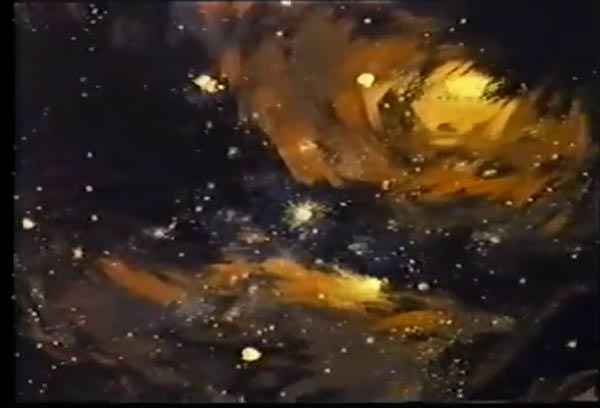

The Jetsons. Watched the closing credits, and noticed something that seemed odd when I was a kid. As we all know, George is walking the dog on a treadmill outside. A cat approaches, hisses, arches its back. In order for the gag to proceed, Astro has to chase the cat, which makes the treadmill go fast, leading to the spousal request to stop this crazy thing.
But the cat has to leap towards the dog to get on the treadmill, instead of turning around and running.
By the way, the Jetsons theme? Today I learned that those insane trumpet riffs were played by Bud Brisbros, who also played trumpet on the "Hawaii Five-0" theme. I had no idea, nor did I know he was born a few miles from where I live. From his bio, documenting his downward slide:
In 1975 following the breakup of his second marriage, Brisbois began having increasing problems controlling his manic depression, from which he had suffered all his life. He quit the music business entirely and moved to Beverly Hills, where for a time he worked as a Porsche salesman.
Imagine driving around with the guy, trying out the ride, and you get to to talking, and finally he says, he used to play music. Really? What kind? Oh, big band, soul, some TV stuff. Really? TV? Anything I might know? I played that riff right before they sang Meet George Jetson.
Would you believe him?


WEEKLY BORDEN
Well, things are back to normal at the Cow House:

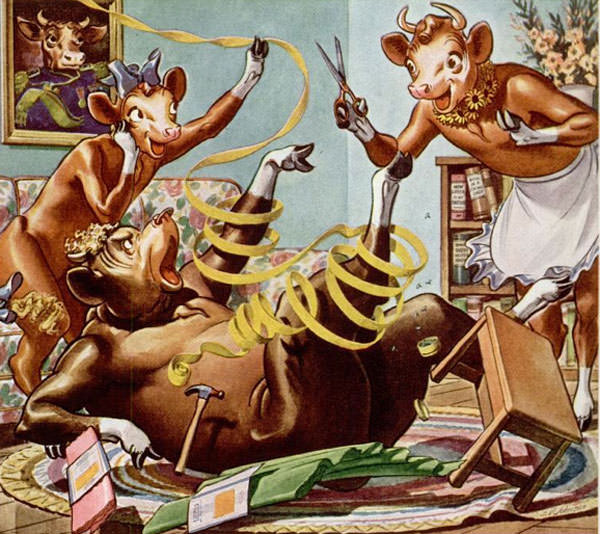
While you can see how Elsie managed to hold the scissors, it's a mystery how Elmer grasped the hammer. Or why he had it in the first place. The answer, of course, is obvious from the text:
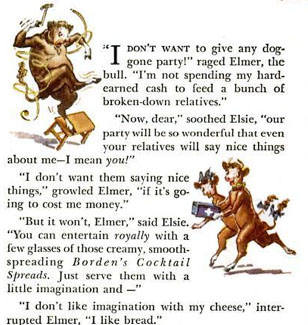
Elmer didn't want to have people over to the Cow home, interrupting his life, forcing him to socialize, letting in busybody people who would cluck their tongues about how much he had gained and how much he seemed to be drinking these days. Really, I don't know why she stays with him.
Elsie really rubs it in, too: your relatives will say nice things about you. If that seems odd it's explained in the next breath, when Elmer notes that he doesn't want anyone to say nice things, because their very presence costs him money.
All he wants is to be left alone with bread and cheese.
HALLOWEEN THEN

There wasn't much back then. Halloween had not been usurped by adults, and was a minor thing for the culture at large. The candy makers, of course, took advantage of the opportunity

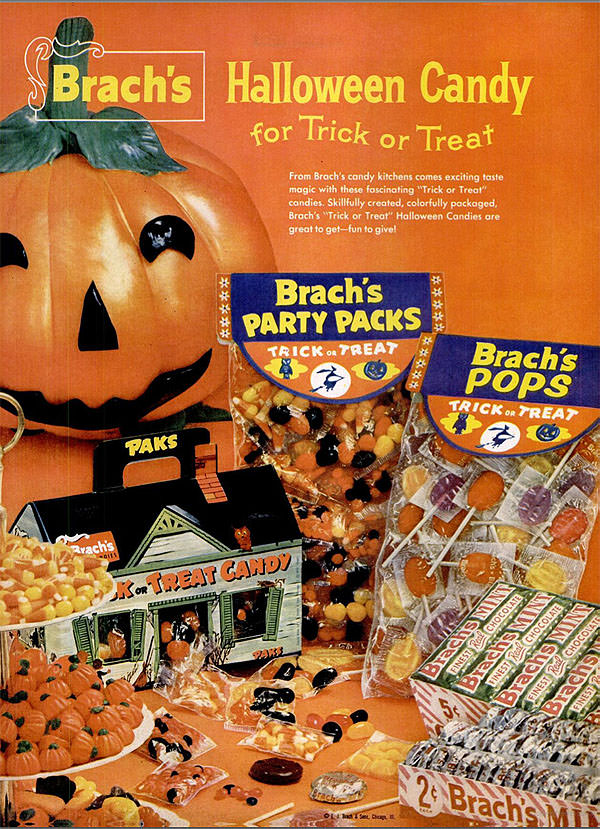

Some specific offerings, magnified from the bottom of the ad. I want those Banana Split bars, although I suspect it was "taffy" flavored with that unconvincing banana flavor. Don't get me wrong; it was good, in popsicle form - especially in popsicle form - but it just wasn't banana.
Heaven help you if you got a house that bought the 70-piece pac. Nothing but hard stuff.

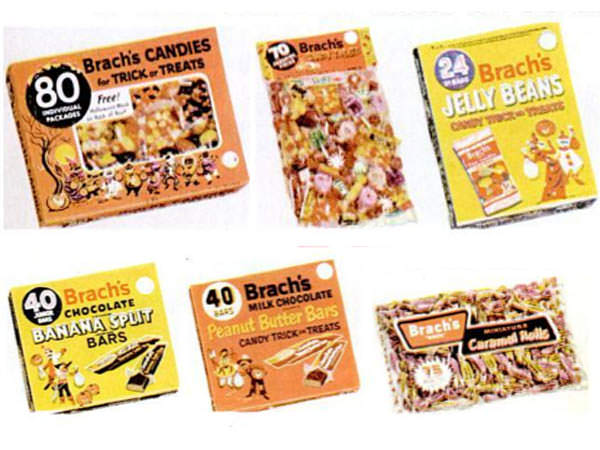

BEHOLD THE INVENTION OF THE FUN SIZE
Or perhaps the concept.

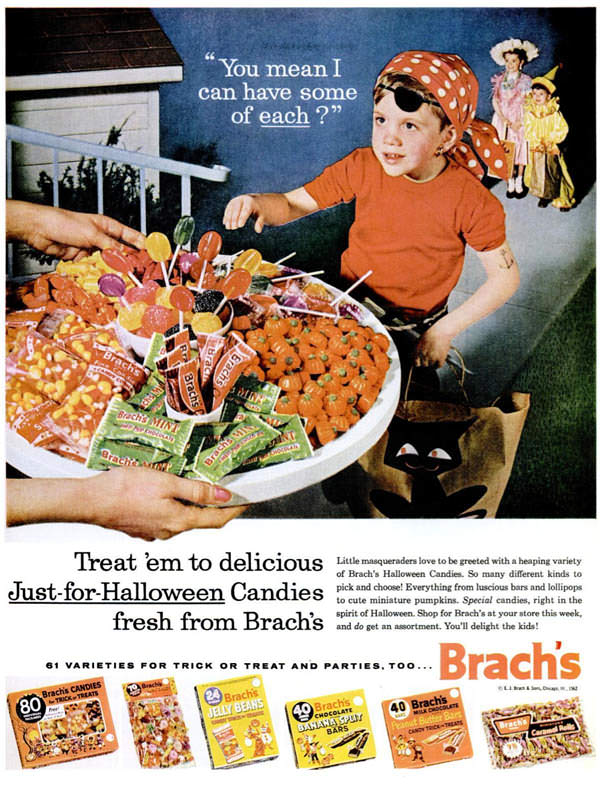

A dubious connection, this:
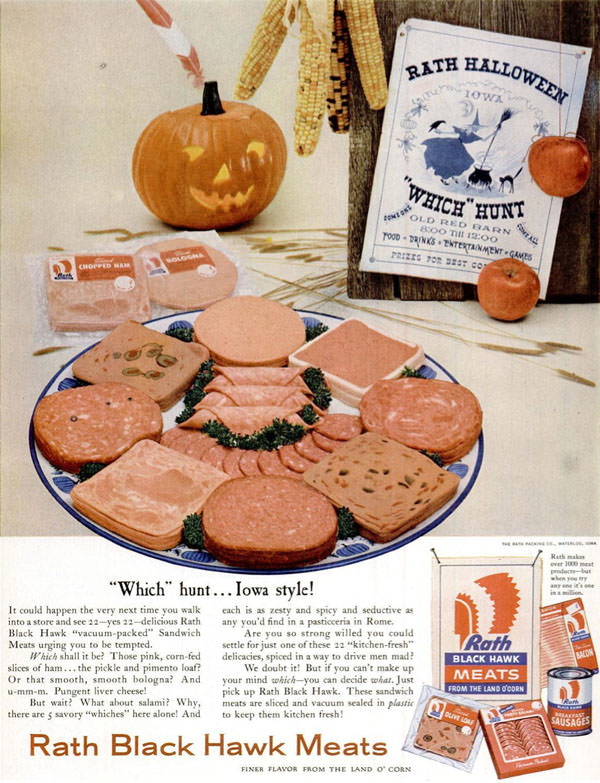

Rath had a hard time in the 80s, and finally packed it in - get it? - in 1985.

OBSCURE SNACKTITUDE
Dried, preserved, chemically saturated bacon rinds:

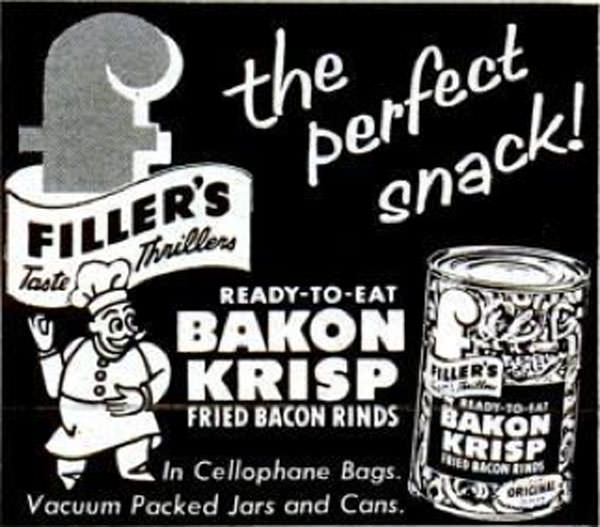

It's nothing but Filler! probably was one rejected slogan. Looks like they retreated to the Spanish markets:


BYGONE SOAP
One ad for washday miracles had an assemblage of brands, most of whom were on the way out. You can see the 50s go back to the 30s in just one sequence:



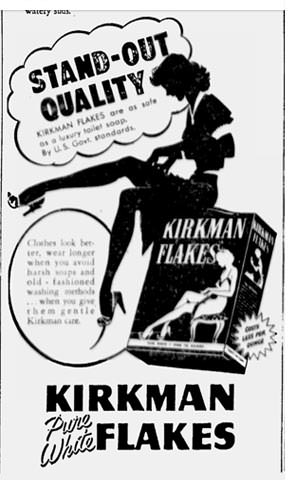 This site says that Octagon smelled like Lemon, and was made by Colgate - which helps one Google the rest. Super Suds, says this ad, was introduced in 1954 - it's NEW, insamuch as it had BLUE crystals. That could mean it was being relaunched; the graphics certainly remind me of the late 20s or 30s. (NOTE: googled some more, and found 30s examples of the product. This site says that Octagon smelled like Lemon, and was made by Colgate - which helps one Google the rest. Super Suds, says this ad, was introduced in 1954 - it's NEW, insamuch as it had BLUE crystals. That could mean it was being relaunched; the graphics certainly remind me of the late 20s or 30s. (NOTE: googled some more, and found 30s examples of the product.
Kirkman started in 1913; bought by Colgate in 1929. Actually, Colgate-Palmolive-Peet.
What? Peet. It was a Missouri soap maker, and merged first with Palmolive.
VEL was probably named because it made your hands feel like VELVET, and "VET" sounded like detergent for farm animals.
Here's another ad, which shows how they used the silouhettes for branding:

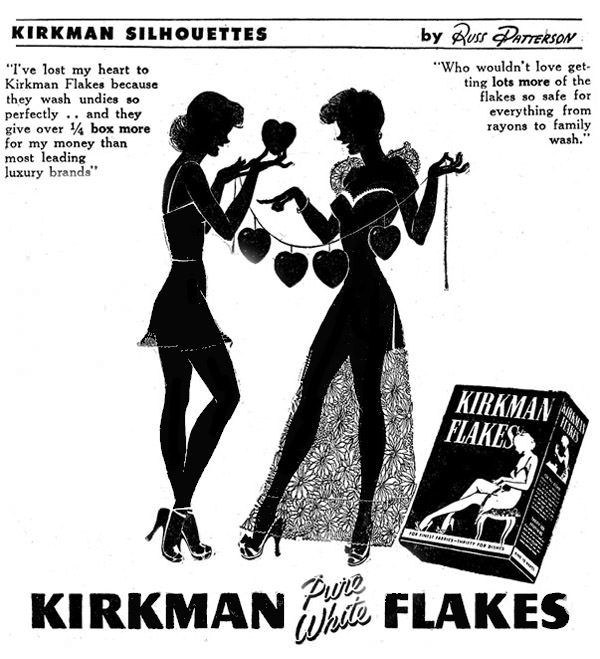

That's the work of Russ Patterson, an illustrator who helped define the "Flapper" persona. Wiki: "A beauty expert, Patterson judged Miss America contests from 1927 to 1945 and Miss Universe pageants from 1960 through 1963."
Beauty Expert! There's a good line of work
-----
Enough for today; see you around Oh - sorry; forgot about the answer to yesterday's mystery. You can wait, can't you? I'll pick it up tomorrow.
Work blog around 12:30 and Tumblr as well. See you around!
|

